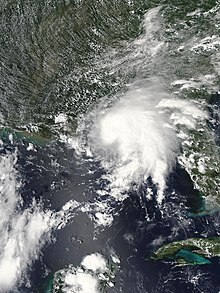 Tropical Storm Gordon near peak intensity just off the coast of Alabama on September 4 | |
| Meteorological history | |
|---|---|
| Formed | September 3, 2018 |
| Remnant low | September 6, 2018 |
| Dissipated | September 8, 2018 |
| Tropical storm | |
| 1-minute sustained (SSHWS/NWS) | |
| Highest winds | 70 mph (110 km/h) |
| Lowest pressure | 996 mbar (hPa); 29.41 inHg |
| Overall effects | |
| Fatalities | 3 direct, 1 indirect |
| Damage | $200–250 million (2018 USD) |
| Areas affected | Hispaniola, Cuba, The Bahamas, South Florida, Florida Keys, Gulf Coast of the United States, Arkansas, Missouri, United States East Coast, Southern Ontario |
| IBTrACS | |
Part of the 2018 Atlantic hurricane season | |
Tropical Storm Gordon was a strong tropical cyclone that caused damage along the Gulf Coast of the United States in early September 2018. The seventh named storm of the 2018 Atlantic hurricane season, Gordon developed from a tropical wave that was first monitored in the Caribbean Sea on August 30. The wave moved west-northwestward toward the east coast of Florida while gradually organizing. The disturbance was marked as Potential Tropical Cyclone Seven on September 2 while near the Bahamas, and early the next day, it became Tropical Storm Gordon. The system made landfall on the southwest coast of Florida shortly afterwards. Steady intensification began after it moved off the coast of Florida and into the Gulf of Mexico. Gordon reached its peak intensity as a high-end tropical storm late on September 4 before making landfall just east of Pascagoula, Mississippi shortly afterwards. Gordon then rapidly weakened as it tracked inland, and degenerated into a remnant low on September 6. Gordon's remnants lingered over Arkansas for two days, before opening up into a low-pressure trough on September 8. At least three deaths were attributed to the storm, and Gordon caused approximately $200–250 million (2018 USD) in damages.[1]